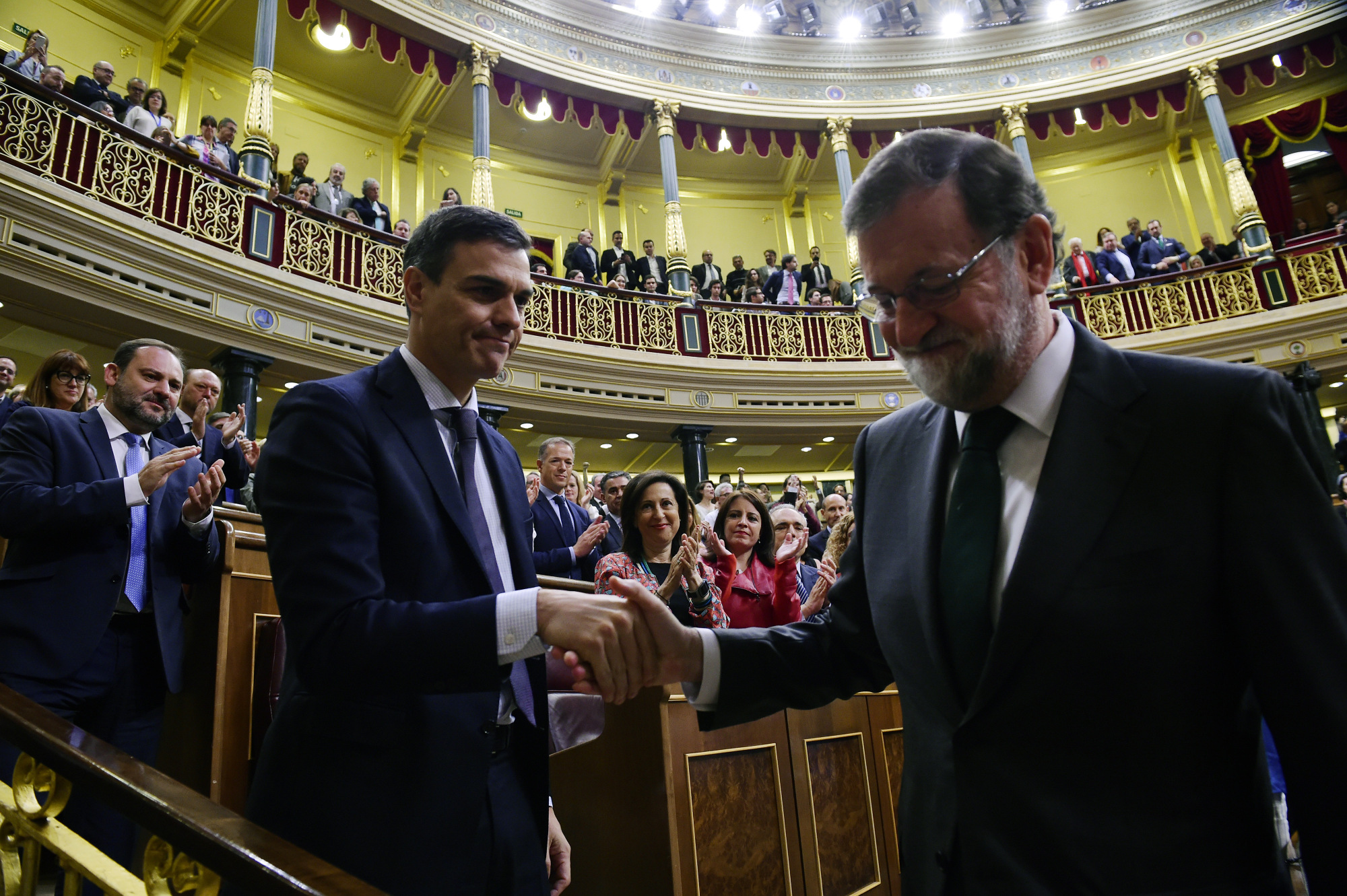On the way to the 2015 election’s biggest debate, Pedro Sanchez’s team were psyching up the candidate.
Their strategy hinged on nailing Prime Minister Mariano Rajoy for his ties to a party corruption racket. They’d rehearsed the line — Rajoy wasn’t fit to hold the office — and they knew such a personal attack would be shocking to many people.
Everything depends on you saying it, the candidate’s aides told him as he stepped out of the car, according to a person with knowledge of the exchange.
Sanchez said it.
That combination of boldness and principle Sanchez showed on television that night finally made the Socialist leader prime minister last week. In the two and half years that have elapsed since that debate, Spaniards have learned something else about their new leader: he doesn’t know when he’s beaten.
‘Audacity With Safety’
The 2015 election was a damage limitation exercise for the now 46-year-old Sanchez. Leading a
wounded party against the emerging threats of Podemos on the left and Ciudadanos in the center required a balancing act as he pounded Rajoy, who denied any involvement in the party slush fund the National Court was investigating.
“Change can be for good if you combine audacity with safety,” Sanchez said in a
Bloomberg News interview that year as he prepared to meet International Monetary Fund chief Christine Lagarde. “That’s what the Socialist party stands for.”
He salvaged second place, earning his party’s worst result since Spain returned to democracy in 1978. With parliament split four ways, Sanchez tried and failed to stitch together an anti-Rajoy coalition. In the election re-run of June 2016, the Socialists did even worse.
After almost a year without a proper government, anxiety was growing among the Spanish elite and Socialist grandees demanded Sanchez lift his veto on Rajoy to break the impasse. When Sanchez held firm, he was ousted in a party coup backed by the El Pais newspaper.
Refusing to take part in the abstention that would let Rajoy back in, or to break party discipline in Parliament, Sanchez resigned his seat.
Ten months after their TV confrontation, Rajoy had full control of the government again. Sanchez was unemployed and ostracized by his party.
“I’m not sure he could talk for more than half an hour about what should be done with Spain,’’
Felipe Gonzalez, the 76-year-old former prime minister who helped push him out, said in November 2016. “He’s a lot more interested in his party than in his country.’’
On the Road
Few outside of Socialist circles had heard of the rookie lawmaker when he started his run for the party’s first ever open primaries. A junior economics professor, Sanchez had worked as an adviser in the European Parliament and then chief of staff for the United Nations’ high representative in Bosnia before joining the party’s economic team in 2000 under Jordi Sevilla.
The Socialist establishment already had its candidate lined up for the 2015 election. But Sanchez upended the race, covering more than 25,000 miles (40,000 kilometers) criss-crossing the country in his Peugeot 407 sedan to speak to rank and file members. His twitter feed from that time shows photo after photo of Spain’s new prime minister speaking to groups of as few as a dozen people.
“He has a fresh style of leadership,” said Sevilla who served as a minister under Jose Luis Rodriguez Zapatero before joining his former protégé as an adviser. “It’s different from what older people like me are used to, but it connects with people.”
Starting Over
When his first stint at the head of the party unraveled so publicly, Sanchez went back to retail politics.
“I’m going to start again,’’ he told reporters in October 2016 after quitting parliament. “Starting on Monday, I’m getting back in my car to travel through every corner of Spain again and listen to those that haven’t been heard — the party members and left-wing voters of this country. Together we will win back the Socialist party.”
And they did.
The party machine threw all its resources into stopping him. But nine months later in July 2017 he won another primary to take control of the group again.

Sanchez and Mariano Rajoy at the Lower House of the Spanish Parliament on June 1.
Photographer: Pierre-Philippe Marcou/Pool via Getty Images
When the National Court on May 24 convicted Rajoy’s former aides of running a corruption racket from inside the party, Sanchez judged that filing
a no-confidence motion might secure him another unexpected victory.
“He has a great ability to read the battlefield,’’ said Manuel de la Rocha, head of the Socialists’ economic policy through Sanchez’s two election campaigns. “That’s something that the right clearly underestimated.”
